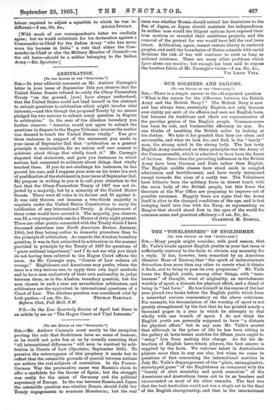OUR SOLDIERS AND SAILORS.
[TO THE EDITOR OF THE " SPECTATOE."1
SIR,—There is a simple answer to the oft-repeated question " What is the reason for the difference between the British Army and the British Navy ? " The British Navy is now and has always been, essentially English, not only because over eighty per cent. of its officers and men are English born, but because its traditions and ideals are representative of the peculiar genius of the English people. Common-sense has been its rule, and businesslike efficiency its aim. No one thinks of insulting the British sailor by looking at his clothes. We take it for granted that they are clean and serviceable, and what we look for, and find, is the " handy " man, the strong mind in the strong body. The last truly English Army conducted on these principles was the Army of the Commonwealth, which is admitted to have been the finest of its time. Since then the prevailing influences in the British Army have been German and Irish rather than English. The English middle classes have stood aside in mingled admiration and bewilderment, and have rarely interposed except towards the close of a costly war. The Volunteers have hitherto been the military force in closest touch with the main body of the British people, but this force the theorists at the War Office are proposing to improve out of possible existence. Happily there are signs that the Army itself is alive to the changed conditions of the age, and is fast bringing itself into line with the Navy, as representing an Empire that should stand first in the eyes of the world for common-sense and practical efficiency.—I am, Sir, &c., CLARENCE M. DOBELL.










































 Previous page
Previous page